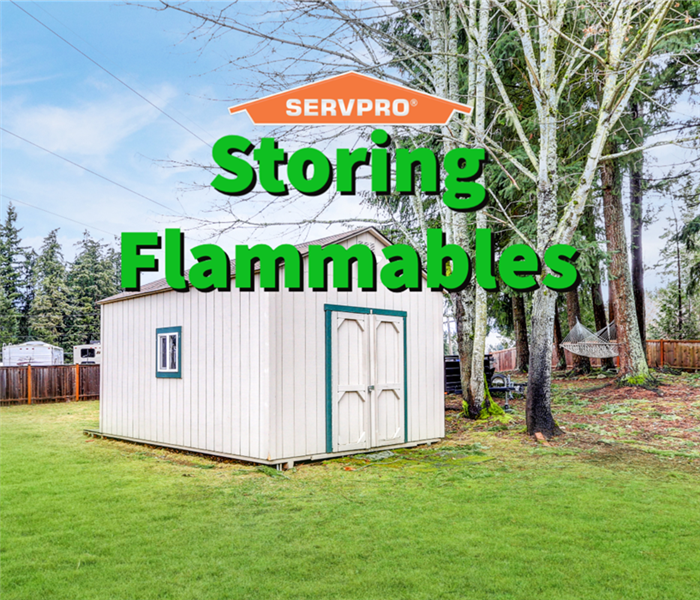Storing Flammables: The #1 Guide For Safe Flammable Storage
10/24/2022 (Permalink)
Incorrectly storing flammables can cause dangerous accidents like fires.
Did you know that the way you store your flammables can be the difference between a safe home and a disaster? Incorrectly storing flammables can cause dangerous accidents such as fires because of the emitted odors. Therefore, you must understand how to store flammables correctly to avoid disasters.
At least once every few months, the professionals at SERVPRO of Jackson and Madison Counties receive a call about avoidable fire damage from a homeowner that improperly stored flammables on their property.
To help prevent unnecessary fire restoration services in the future, we have put together a guide on storing flammables for everyone’s benefit. In this guide, we will provide tips on how to store flammables safely and securely so that you can avoid any dangerous accidents.
Before we begin, if you ever need fire restoration services, contact the experts at SERVPRO of Jackson and Madison Counties! We’ll make it “Like it never even happened.”
What are flammable liquids?
Flammable liquids are liquids that can easily catch fire and burn. Some common flammable liquids include gasoline, kerosene, and oil. Because of how common these chemicals are, you must understand the dangers of incorrectly storing flammables in your home; any of these can easily ignite and cause a fire.
What are the dangers of not storing flammables correctly?
The dangers of incorrectly storing flammables are vast and can include everything from a small fire that damages belongings to a large fire that destroys your home. Some of the dangers of incorrectly storing flammables include the following:
- The flammables can easily ignite and cause a fire
- They can produce dangerous fumes that can be harmful if inhaled
- They can explode if not stored correctly, creating projectiles
Tips on how to store flammables safely and securely
Now that you understand what flammables are and the dangers of storing them incorrectly, let us review some tips on safely keeping them on your property:
Tip 1: Be mindful of the temperature in the storage area
Flammables should always be stored in a cool, dry place. Avoid storing them near any heat sources, such as stoves or furnaces.
Tip 2: Store flammables in Factory Mutual (FM)-approved safety containers.
It is a good idea to store flammables in a factory Mutual (FM)-approved safety container with a tight-fitting lid. Some examples of FM-approved safety cans include:
- 5-gallon gas cans
- 2.5-gallon gas cans
- Kerosene storing containers
- Oil-storing containers
Tip 3: Label the containers
Labeling all the containers in which you store flammables is a best practice. Labeling will help ensure that everyone in your household knows the contents of the containers.
Tip 4: Follow the manufacturer’s instructions
When storing flammables, always follow the manufacturer’s instructions. These instructions are put in place for a reason and should always be followed to ensure your home’s safety.
Tip 5: Store flammables away from the house
It is a good idea to store flammables in a shed or garage away from the house. Keeping flammables away from the main part of the property will ensure that the flammables can’t affect the most critical aspects of your property if anything goes wrong.
The professionals at SERVPRO can help you recover from property damage.
The professionals at SERVPRO are experienced in dealing with fires caused by storing flammables incorrectly. If you experience any property damage due to a fire, please do not hesitate to contact us.
After we receive your call, we will:
- Quickly dispatch a crew
- Inspect and assess the damage to your home
- Develop a plan of action
- Execute the plan of action
- Restore your home to its original condition
SERVPRO of Jackson and Madison Counties is available 24/7 and understands that dealing with property damage can be stressful. Our goal is to make the process as smooth and stress-free as possible for you. We also appreciate that correctly storing flammables can be difficult, and we hope this guide has provided some helpful tips. If you have any further questions, please do not hesitate to contact us. We are always here to help!

 24/7 Emergency Service
24/7 Emergency Service
